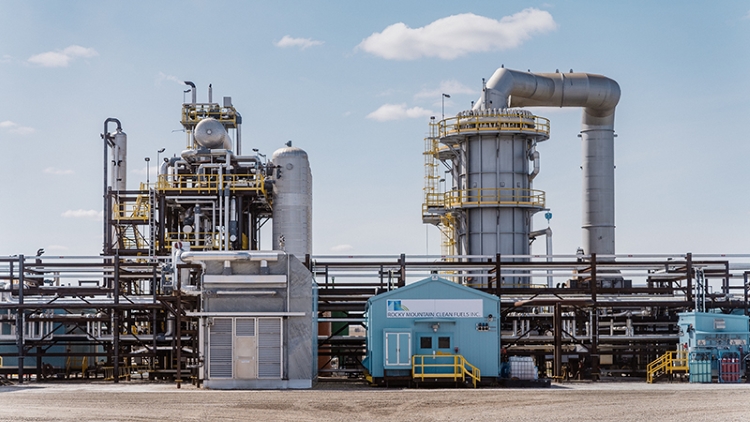Alberta is home to one of Canada’s largest petrochemicals manufacturing industries, and it is the largest manufacturing sector in the province. To further grow the sector, Alberta’s government launched the Alberta Petrochemicals Incentive Program (APIP) in October 2020. The program has been instrumental in attracting more investment and growing all aspects of the energy industry.
Through APIP, Alberta’s government is investing more than $20 million in Rocky Mountain Clean Fuels’ synthetic diesel facility to continue to bring more investments and jobs to the province.
The grant will support a synthetic diesel plant in Wheatland County near Carseland, east of Calgary, that uses natural gas and natural gas liquids as feedstock to produce synthetic diesel, naphtha and wax. Naphtha is a petroleum fraction that can be used for gasoline blend stock and diluent. The plant will make a small volume of high value Fischer Tropsch paraffin wax used for lubricants, hot melt adhesives, paints and coatings.

Rocky Mountain Clean Fuels’ synthetic diesel facility near Carseland, Alberta. Credit: Rocky Mountain Clean Fuels
“Alberta is the economic engine of Canada, and our job creation and diversification is key to this. We are committed to making Alberta a world leader in petrochemicals and APIP is helping to attract investment, like this Rocky Mountain Clean Fuels project, as we capitalize on opportunities throughout the province.”
Projects like the one from Rocky Mountain Clean Fuels are critical to Alberta’s push for energy diversification and efforts to lower emissions. Alberta is at the global forefront of this type of innovation, and the APIP grant has played a major role in attracting billions of dollars in investment.
APIP funds up to 12 per cent of an eligible project’s capital costs, only paying out following completion of construction. For larger projects, like the one with Rocky Mountain Clean Fuels, the grant is paid out over three years. Three other projects have received APIP funding, including Inter Pipeline’s Heartland Petrochemical Complex, Dow Canada’s Fort Saskatchewan Furnace Expansion and Air Products’ Net-Zero Hydrogen Complex.
“APIP is helping make our province, including rural areas, an attractive jurisdiction for investment. In addition to the good-paying jobs created for construction and operations, the facility will generate economic spinoffs in the Carseland region.”
Rocky Mountain Clean Fuels recently opened its $173-million facility, with production starting at the end of November. The facility is already producing about 220 barrels per day (bpd) of synthetic diesel, naphtha and wax, and is expected to produce 500 bpd at full capacity. Future expansions may include increasing daily fuel output; integrating hydrogen production; incorporating carbon capture, utilization and storage technologies; and adding renewable feedstock to further enhance sustainability.
“The Rocky Mountain Clean Fuels Enhanced GTL® technology is well suited to provide significant added value to Alberta’s abundant natural gas resource. The Government of Alberta has shown its commitment again towards practical entrepreneurial-driven solutions that make this province a leader in energy innovation worldwide. Rocky would like to thank the Alberta government for its tremendous support.”
Rocky Mountain Clean Fuels is the first project to receive APIP funding that is not in the Edmonton region. APIP is a province-wide program, and this project will provide an economic boost in rural Alberta through job creation, increased investment and the municipal tax base.
“This project exemplifies the incredible opportunities created through collaboration between industry, our provincial government and municipalities. The Carseland project is not only a significant step in economic diversification and clean energy production, but also a catalyst for job creation, generating over 900 new jobs during construction and operations.”
Quick facts
- APIP is open to almost all types of petrochemical and fertilizer manufacturing plants, such as petrochemical, fertilizers, hydrogen and fuel plants.
- The Rocky Mountain Clean Fuels project is qualified to receive an APIP grant of $20,776,850.20.
- The project has created more than 900 new jobs in total during construction and operations, which began on November 27.
Related information
Related news
- New petrochemical funding to drive economic diversification (Nov. 10, 2022)
- Major investment moves Alberta’s hydrogen sector forward (Nov. 8, 2022)
- Petrochemical program gains momentum (April 5, 2021)
- Petrochemical program is open for business (Oct. 30, 2020)